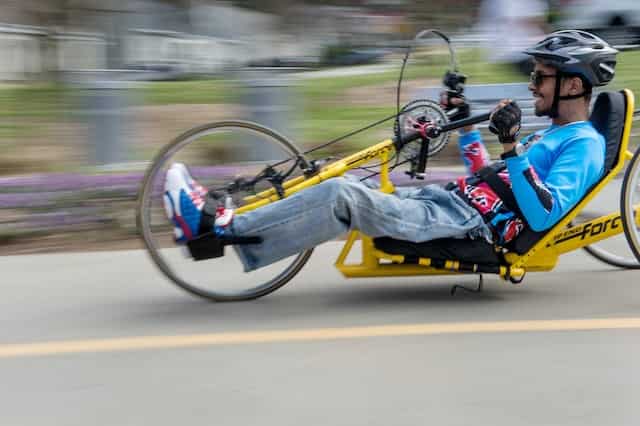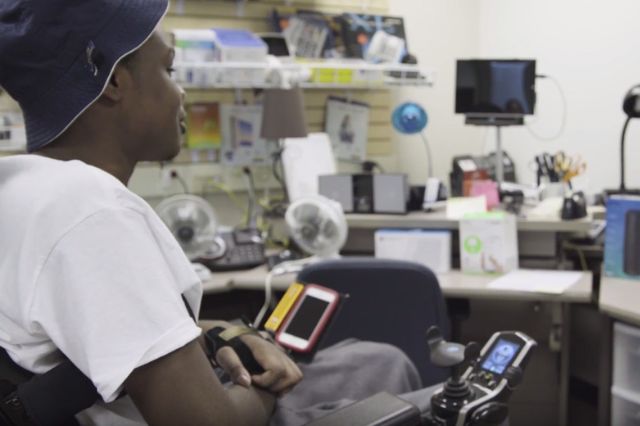History and Mission
James Shepherd’s Story
In a time of crisis, it may be reassuring to know that there is another family that's been in your shoes – the Shepherd family, who co-founded Shepherd Center in 1975.
Shepherd Family History
James Shepherd set out on a backpacking trip around the world in 1973 after graduating from the University of Georgia. While bodysurfing off a beach in Rio de Janeiro, he was slammed to the ocean floor by a wave. James, who was 22 at the time, sustained a spinal cord injury and became paralyzed from the neck down.
After spending five weeks in a Brazilian hospital struggling to survive, he returned to the United States and was admitted to Piedmont Hospital in Atlanta. While physicians at Piedmont were able to keep James alive despite cardiac arrests, respiratory failures and fevers, they could not offer any form of rehabilitation. By the end of his 10-week stay at Piedmont, James had lost nearly all his muscle strength and weighed just 82 pounds.
Faced with a prognosis of lifelong paralysis, the Shepherds turned to a specialized rehabilitation facility in Denver. It was recommended by family friend and former Dekalb County, Georgia, commission chairman, Clark Harrison, who had been paralyzed after being shot by a German sniper in 1944. Clark made weekly trips to visit James at Piedmont and, sharing his own story of a successful life in a wheelchair, he helped convince James his life was not over. With the support of his family and friends, James completed four months of intensive rehabilitation in Denver and regained his ability to walk using a cane and leg brace.
Getting Started
After returning home to Atlanta, James and his parents, Harold and Alana Shepherd, were frustrated with the lack of rehabilitation care options in the Southeast. With the help of Clark Harrison and David Webb, chairman of President Carter's White House Conference on Handicapped Individuals, the Shepherds hurled themselves into the task of creating a rehabilitation center.
The Shepherds began recruiting support, first from old friends in the community, then from every individual, foundation or corporation who might help fund the facility. They also recruited Atlanta orthopedist David Apple, M.D., who helped locate some space for the facility. Dr. Apple became Shepherd Center’s first medical director and now serves as medical director emeritus.
With enthusiastic support, Shepherd Center was founded in 1975 as a six-bed unit operating out of leased space in an Atlanta hospital. While the Center has grown exponentially since then, it has always maintained its original goals – to provide a patient- and family-centered approach to rehabilitation and to encourage patients to look beyond their injuries and embrace the future.
Shepherd Center was founded in 1975 by James Shepherd and his parents, Alana and Harold Shepherd, along with medical director emeritus David Apple, M.D. Today, it has more than 150 beds and treats people with spinal cord injury, brain injury, multiple sclerosis, and chronic pain.
Historical Milestones
1975: Shepherd Spinal Center opened its doors as a six-bed facility, staffed by two doctors, three therapists and nursing support from the leasing hospital. Almost immediately, there was a waiting list.
1982: The hospital moved to its current location on Peachtree Road in Atlanta’s Buckhead area. The new 93,000-square-foot facility housed 40 beds and allowed room for growth in specialized programs, such as peer support and advocacy, that have become Shepherd Center hallmarks.
1991: The Multiple Sclerosis Institute opened to provide treatment to people with multiple sclerosis (MS), suspected MS or related disorders. It is later renamed the Andrew C. Carlos Multiple Sclerosis Institute at Shepherd Center.
1992: The Center doubled in size with the opening of the Billi Marcus Building, a 153,000-square-foot expansion named for the resolute fundraiser and wife of The Home Depot’s former chairman, Bernie Marcus. This development allowed Shepherd to expand outpatient services and provide space for its newly created Multiple Sclerosis Institute.
1995: Gary Ulicny, Ph.D., the Center’s first president and CEO, established acquired brain injury (ABI) as Shepherd Center’s third area of specialty, adding a 20-bed unit for patients with ABI.
1997: The hospital launched Shepherd Pathways, a post-acute brain injury rehabilitation center in nearby Decatur, Georgia, that provides community-based outpatient services, a day program and residential program.
2000: Shepherd Spine and Pain Institute opened to serve people with pain resulting from neurologic degenerative disease or injuries. It is renamed the Dean Stroud Spine and Pain Institute in 2007.
2005: Shepherd Center Foundation was established to set development policy and act as the major fundraising entity for Shepherd Center.
2005: Shepherd Center launched Beyond Therapy®, a rigorous, activity-based program designed to help people with a variety of neurological disorders improve lifelong health, minimize secondary complications and get the most from any new neural links to their muscles.
2007: The Jane Woodruff Pavilion was added to the Marcus Building, nearly doubling the size of the hospital with an additional 170,000 square feet. Among other things, the expansion increased the number of patient beds from 100 to 120, and provided additional therapy gyms and treatment rooms, a new cafeteria and dining facility, and additional office space.
2008: Shepherd Center completed the Irene and George Woodruff Family Residence Center, a $16 million residential center adjacent to the hospital that provides temporary housing for families of patients. The 87,000-square-foot facility includes 84 wheelchair accessible suites, each containing a bedroom, living space, kitchenette and bathroom.
In the same year, Shepherd Center launched the SHARE Military Initiative thanks to a generous donation from Atlanta philanthropist Bernie Marcus. As an extension of the ABI Program, SHARE provides treatment for military personnel who have sustained brain injuries, along with diagnoses of post-traumatic stress and other mental health conditions.
2010: Shepherd Center completed a $9.8 million renovation and remodeling project that created more private rooms for patients, added a second brain injury unit, and reconfigured and remodeled various units in the Center.
2014: Shepherd Center embarked on a $12.5 million renovation and building project to add 13,000 square feet for an expanded and updated lab, pharmacy and MRI suite.
2016: Shepherd Center launched the Complex Concussion Clinic to address complications of mild brain injuries in patients.
2017: Shepherd Center opened a new facility at 80 Peachtree Park Drive to house the SHARE Military Initiative, Complex Concussion Clinic, and Eula C. and Andrew C. Carlos Multiple Sclerosis Rehabilitation and Wellness Program.
2017: Sarah Morrison, PT, MBA, MHA, became president and CEO of Shepherd Center, having served in various leadership roles at the hospital since 1984.
2018: Thanks to a generous donor, Shepherd Center’s CT scanner became operational in August 2018. Having a CT scanner in house has saved hundreds of hours of nursing staff time by eliminating the need to move patients to adjacent Piedmont Atlanta Hospital for these scans. This allows our nurses more time to be on the rehabilitation units with our patients.
2018: Shepherd Center acquired 2.6 acres of nearby land to expand our family housing program. Shepherd Center is committed to reducing the financial and emotional burden our families experience during one of the most challenging times of their lives. This housing expansion will allow for our out-of-town families to stay with their loved ones for as long as they are at Shepherd Center.
2018: The naming of the J. Harold Shepherd Parkway section of Peachtree Road honored Shepherd Center co-founder, the late Harold Shepherd. This is a testament to the incredible contributions Harold Shepherd made to Atlanta and beyond, as well as to the community support for the Shepherd family and the recognition of Shepherd Center’s ability to provide its patients with hope, dignity and independence.
2019: Shepherd Center launched a new electronic medical record system called Epic to enhance patient safety, collaboration and efficiency to meet patients’ unique needs across the continuum of care.
2019: Shepherd Center co-founders Alana Shepherd and James Shepherd were recognized on August 22, 2019, with Lifetime Achievement Awards at the Atlanta Business Chronicle’s Most Admired CEOs Awards dinner. They were among 44 leaders in 22 categories and industries, from accounting to utilities and energy, who were honored.
2020: Shepherd Center celebrated its 45th anniversary. In its first 45 years, Shepherd Center grew from a six-bed rehabilitation unit to a world-renowned, 152-bed hospital.
2021: Shepherd Center expanded its research prowess by receiving the Spinal Cord Injury Model Systems grant for the 8th time, enrolling the first participant in the UP-Lift trial for electrical stimulation for people with chronic tetraplegia; enrolling its first patient in a stem cell trial for MS; and, receiving a grant from the Wounded Warrior Project to study telehealth/hybrid programming for SHARE clients.
2022: Received generous grants from The Arthur M. Blank Family Foundation and the Marcus Foundation to expand access to care for patients and their families.
Shepherd Center for Rehabilitation Today
Today, Shepherd Center is a state-of-the-art facility with 152 beds, including a 10-bed intensive care unit. In 2018, Shepherd had 935 admissions to its inpatient programs and 541 to its day patient programs. In addition, more than 7,300 people were seen on an outpatient basis in more than 54,600 visits.
Shepherd Center conducts up to 50 research projects annually and is a Spinal Cord Injury Model Center, as designated by the National Institute on Disability, Independent Living, and Rehabilitation Research. Shepherd Center is also ranked among the top 10 best rehabilitation hospitals in the nation by U.S. News & World Report.
Shepherd family members are still dedicated advocates for the Center. James’ mother, Alana Shepherd, continues to raise funds, welcome new patients and serves on Shepherd Center’s Board of Directors. James’ son, Jamie Shepherd, is the chief operating officer, and his daughter, Julie Shepherd, is a case management team leader. Before his passing in December 2018, Harold Shepherd, James’ father and the founder of Shepherd Construction Company, worked to recruit friends and associates to help support the Center.
Unfortunately, James Shepherd passed away in December 2019. James devoted his life to ensuring Shepherd Center’s clinical teams could take the so-called impossible cases and help people put their lives back together. James often said that Shepherd Center is the bridge between “I can’t” and “I can.” Thanks to him, thousands of patients and families have found a pathway to independence, hope and dignity.
More than a hospital, Shepherd Center also advocates for all people with disabilities. Shepherd has worked regionally to improve accessibility of rapid transit systems, sports complexes, airports, local businesses and housing facilities. The hospital sponsors 11 wheelchair sports teams and has served as official sponsor of the Shepherd Center AJC Peachtree Road Race Wheelchair Division since 1984. Shepherd was also the founding sponsor of the 1996 Atlanta Paralympic Games, bringing 3,310 world-class athletes with disabilities from 104 nations to Atlanta for Olympic-level competition.
Although Shepherd has evolved greatly since 1975, it remains dedicated to helping people with catastrophic injuries and illnesses reclaim their lives with dignity, independence and hope.
Our Mission
Shepherd Center's mission is to help people with a temporary or permanent disability caused by injury or disease, rebuild their lives with hope, independence and dignity, advocating for their full inclusion in all aspects of community life while promoting safety and injury prevention.





